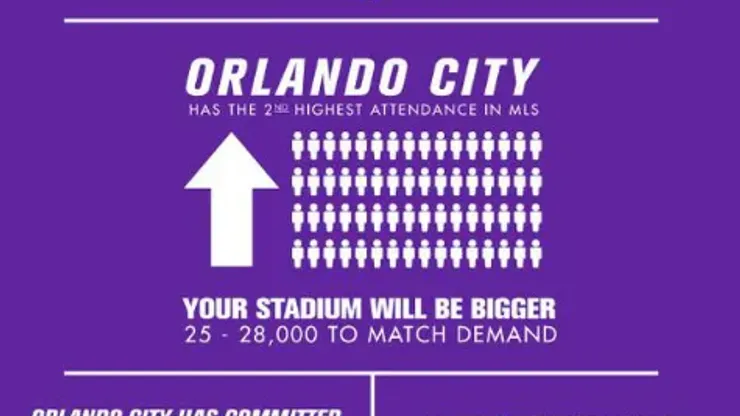On Friday afternoon, Orlando City SC announced a historic private stadium funding initiative, which includes increasing the capacity of the soon-to-be-built downtown facility to 25,000-28,000 seats. The news represents a political shift for an MLS club away from public funding and toward team owners making their own financial commitment to financing new stadiums. The Lions are the latest club to accept the political realities of stadium funding in this era and to pull back from the effort to secure public money.
“Orlando is an incredible market for professional soccer and attendance at our matches clearly demonstrates that demand,” said Orlando City SC Majority Owner Flavio Augusto da Silva. “Before deciding to invest in Orlando City, I researched several markets around the country for professional soccer but Orlando became the ideal location because of the fan base and the city’s leadership. I believe in Mayor Dyer’s vision for the future of this great city, which is why we are investing even more into this project today. I am very excited for the future and very grateful for the wonderful partnership with Mayor Dyer and the City of Orlando.”
“We have repeatedly called Orlando the ‘Soccer Capital of the South’ and our fans continue to strengthen that reputation each and every week,” said President and Founder Phil Rawlins. “The incredible response from our fans and partners has led us to pursue a larger facility with enhanced amenities. We didn’t come here to be average, we came here to continually defy expectations and our vision for the new stadium will rank us among the top three clubs in MLS.”
Minnesota United FC has already announced plans to privately fund their outdoor stadium which is critical to their 2018 move from the second-tier North American Soccer League (NASL) to MLS. The San Antonio Scorpions of NASL privately financed an 8,000 seat soccer-specific-stadium that opened in 2013, and several other lower division clubs have looked to privately finance stadiums. However, the cost difference between a small lower-division facility and larger MLS size stadium is substantial so Orlando City’s commitment could represent a major sea change in how larger soccer stadiums in the US are financed.
Orlando City’s new facility will be the first completely privately financed sports stadium in the state of Florida since the building of Joe Robbie Stadium (now Sun Life Stadium) opened in 1987. With David Beckham vowing to privately finance any stadium he builds in Miami, should he acquire the land, MLS has certainly turned the tables on professional sports teams begging for taxpayer money. This will put MLS in a positive light vis a vis other sports leagues if the trend continues.
As for the Lions, the already popular team which has won the hearts and minds of soccer fans across Florida, took another step forward in the eyes of many locals. Since the other major pro sports team in town the Orlando Magic play in a taxpayer funded facility, fans have yet another reason to love the Lions.
200+ Channels With Sports & News
- Starting price: $33/mo. for fubo Latino Package
- Watch Premier League, Women’s World Cup, Euro 2024 & Gold Cup
The New Home of MLS
- Price: $14.99/mo. for MLS Season Pass
- Watch every MLS game including playoffs & Leagues Cup
Many Sports & ESPN Originals
- Price: $10.99/mo. (or get ESPN+, Hulu & Disney+ for $14.99/mo.)
- Features Bundesliga, LaLiga, Championship, & FA Cup
2,000+ soccer games per year
- Price: $5.99/mo
- Features Champions League, Serie A, Europa League & Brasileirāo
175 Premier League Games & PL TV
- Starting price: $5.99/mo. for Peacock Premium
- Watch 175 exclusive EPL games per season






